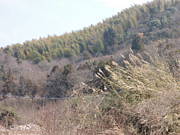「明日は日本も」と思うと、ユダヤ資本に乗っ取られたアメリカの状態に、ちょっと薄気味悪い予感がするニュースだ。
アメリカは、教育・報道・医療・薬品(肥料)などが、ユダヤ資本に乗っ取られており、じわじわと汚染分野や地域が拡大されている。
今度は、種苗の話である。
A public library in small Pennsylvania town offered a new public resource for its patrons: a seed library. That is, until the state Department of Agriculture pulled the rug out from under the plan.
Launched on April 26, the seed library at Mechanicsburg's Joseph T. Simpson Public Library would have held all heirloom, and preferable organic, seed. Its first seed trove, with help from the Cumberland County Commission for Women, came from Seed Savers Exchange, a non-profit organization dedicated to preserving heirloom seeds.
Library patrons could "check out" the seeds to plant, and, if all went well, at the end of the plant's growing season, they'd save its seeds and return them to the library to replenish the stock. If the crop failed or the borrowers were just unable to save seeds, they were allowed to bring back store-bought heirloom seeds instead.
In the process of this seed library circulation, patrons would be bringing a new use to the library space, exchanging seeds with their community members and practicing the art of saving seeds — something farmers have done for years but which stands at odds with proprietary seeds.
"People have been really excited to have this opportunity to borrow seeds," Adult Services Director Rebecca Swanger told local news ABC27 in May. "That way they don't have to purchase a whole packet of seeds and end up not using a lot of them."
According to reporting by the Carlisle Sentinel on July 31, the Pennsylvania Department of Agriculture sent a letter to the library stating that the seed library violated the state's Seed Act of 2004.
While the Act focuses on seeds that are sold, Cumberland County Library System Executive Director Jonelle Darr told The Sentinel that there could also be a problem with seeds being mislabeled and potentially invasive, and noted that the Department indicated it would "crack down" at other seed libraries within the state.
The Sentinel continues:
[Cumberland County] commissioner Barbara Cross noted that such seed libraries on a large scale could very well pose a danger.
“Agri-terrorism is a very, very real scenario,” she said. “Protecting and maintaining the food sources of America is an overwhelming challenge ... so you’ve got agri-tourism on one side and agri-terrorism on the other.”
But not all towns seem to agree with Cross' take that seed libraries pose a danger, as a wave of emerging seed libraries is emerging in towns across the country including Alameda and Richmond, California, Basalt, Colorado and LaCrosse, Wisconsin.
"Seed Libraries are vital to communities," Stephanie Syson, Basalt Food Garden Manager, told Common Dreams. "Seed Libraries offer a common place for community members to share seed that is grown locally, in celebration of cultural heritage and regional diversity. In addition seed libraries offer a chance for low income residents to access vegetable seeds and thus provide much needed nutrition to their families."
Syson emphasized that "a Seed Library is NOT a seed company and should not be regulated in the same manner as one. There are never any 'sales' of seed. The seed is offered as a community asset to be freely shared and enjoyed. Community members understand that the seed does not have a guarantee of germination rates. Through multiple free workshops per year, our community is re-gaining the lost skill of seed saving. This skill is important to our culture as well as our future food security."
It makes sense, really, that these public institutions would be involved in seed libraries. As the Duluth, Minnesota seed library states in its values: "Public libraries play a vital role in communities as a repository for a diversity of ideas and shared knowledge for the public good. Similarly, seed is a public resource and shared legacy – it must be managed in a manner that benefits the public good."
*This post was updated to include comment from Syson.
**According to new reporting by The Sentinel posted Aug. 5, the Mechanicsburg library and Pennsylvania Department of Agriculture together came to a solution that the seed library could continue to offer labeled seeds for the appropriate season, but could not offer unlabeled or older seeds, unless those unlabeled seeds were tested by a lab that follows rules set out by the Association of Official Seed Analysts Inc.
アメリカは、教育・報道・医療・薬品(肥料)などが、ユダヤ資本に乗っ取られており、じわじわと汚染分野や地域が拡大されている。
今度は、種苗の話である。
A public library in small Pennsylvania town offered a new public resource for its patrons: a seed library. That is, until the state Department of Agriculture pulled the rug out from under the plan.
Launched on April 26, the seed library at Mechanicsburg's Joseph T. Simpson Public Library would have held all heirloom, and preferable organic, seed. Its first seed trove, with help from the Cumberland County Commission for Women, came from Seed Savers Exchange, a non-profit organization dedicated to preserving heirloom seeds.
Library patrons could "check out" the seeds to plant, and, if all went well, at the end of the plant's growing season, they'd save its seeds and return them to the library to replenish the stock. If the crop failed or the borrowers were just unable to save seeds, they were allowed to bring back store-bought heirloom seeds instead.
In the process of this seed library circulation, patrons would be bringing a new use to the library space, exchanging seeds with their community members and practicing the art of saving seeds — something farmers have done for years but which stands at odds with proprietary seeds.
"People have been really excited to have this opportunity to borrow seeds," Adult Services Director Rebecca Swanger told local news ABC27 in May. "That way they don't have to purchase a whole packet of seeds and end up not using a lot of them."
According to reporting by the Carlisle Sentinel on July 31, the Pennsylvania Department of Agriculture sent a letter to the library stating that the seed library violated the state's Seed Act of 2004.
While the Act focuses on seeds that are sold, Cumberland County Library System Executive Director Jonelle Darr told The Sentinel that there could also be a problem with seeds being mislabeled and potentially invasive, and noted that the Department indicated it would "crack down" at other seed libraries within the state.
The Sentinel continues:
[Cumberland County] commissioner Barbara Cross noted that such seed libraries on a large scale could very well pose a danger.
“Agri-terrorism is a very, very real scenario,” she said. “Protecting and maintaining the food sources of America is an overwhelming challenge ... so you’ve got agri-tourism on one side and agri-terrorism on the other.”
But not all towns seem to agree with Cross' take that seed libraries pose a danger, as a wave of emerging seed libraries is emerging in towns across the country including Alameda and Richmond, California, Basalt, Colorado and LaCrosse, Wisconsin.
"Seed Libraries are vital to communities," Stephanie Syson, Basalt Food Garden Manager, told Common Dreams. "Seed Libraries offer a common place for community members to share seed that is grown locally, in celebration of cultural heritage and regional diversity. In addition seed libraries offer a chance for low income residents to access vegetable seeds and thus provide much needed nutrition to their families."
Syson emphasized that "a Seed Library is NOT a seed company and should not be regulated in the same manner as one. There are never any 'sales' of seed. The seed is offered as a community asset to be freely shared and enjoyed. Community members understand that the seed does not have a guarantee of germination rates. Through multiple free workshops per year, our community is re-gaining the lost skill of seed saving. This skill is important to our culture as well as our future food security."
It makes sense, really, that these public institutions would be involved in seed libraries. As the Duluth, Minnesota seed library states in its values: "Public libraries play a vital role in communities as a repository for a diversity of ideas and shared knowledge for the public good. Similarly, seed is a public resource and shared legacy – it must be managed in a manner that benefits the public good."
*This post was updated to include comment from Syson.
**According to new reporting by The Sentinel posted Aug. 5, the Mechanicsburg library and Pennsylvania Department of Agriculture together came to a solution that the seed library could continue to offer labeled seeds for the appropriate season, but could not offer unlabeled or older seeds, unless those unlabeled seeds were tested by a lab that follows rules set out by the Association of Official Seed Analysts Inc.
|
|
|
|
コメント(1)
以下引用:
ーーーーーーーーーーーーーーーーーーーーーーーーーーーーーーーーーーーーーー
アメリカ自家菜園禁止法(510法案) ・小規模・兼業農家経営や家庭菜園が違法となった。
アメリカというユダヤ国家は、911自作自演テロを契機に国民に対する締めつけを仕掛け、非常に暮らしにくい国にしてしまった。国民は日々窮屈さを感じ、言論や行動の自由の制限を感じている。
もはや、過去の米国ではありません。正義も自由もない。、金融ユダヤ人に乗っ取られたバカの国。少数の金融ユダヤ犯罪者に支配されいていることがわからない無知無能な群集たちも、そろそろ目が覚める。これ以上の締めつけが国民の覚醒を促す。
アメリカ人、一度火がつくと止められない人たちです。暴動です。ヒスパニックも黒人も。そして、アングロサクソンも。全米暴動で国際的信用丸つぶれ。こっちの選択肢かな?
2014/9/4 20:56
スレチ失礼します。 日本もいつかは、こうなるのでしょうか・・・
アメリカ自家菜園禁止法(510法案) ・小規模・兼業農家経営や家庭菜園が違法となった。
・自給自足と種苗の保存・使用が“犯罪”として取り締まり対象となる。
・食糧生産者に農薬の使用が強制される。
もし、あなたがテラスで家庭菜園の鉢を所有していたら、恐らく隣人によって密告、通報されてしまうだろう。 米国は911直後に成立した愛国者法によって「隣人監視」と密告が奨励されている。 テロ防止の名目で、今や密告奨励社会に変容したアメリカ社会。 510法案により、自然の正常な食品は、犯罪になる。 すでに現在でも、自然食品の生産者や流通業者に食品の強制捜査が入っている。
http://www.commondreams.org/news/2014/08/04/agri-terrorism-towns-seed-library-shut-down
まあ、今のままブラック国家が続けばいずれはこうなってしまいますよね。 トホホです・・・トホホギスでも取り付いたかな?
Usagi
ーーーーーーーーーーーーーーーーーーーーーーーーーーーーーーーーーーーーーー
アメリカ自家菜園禁止法(510法案) ・小規模・兼業農家経営や家庭菜園が違法となった。
アメリカというユダヤ国家は、911自作自演テロを契機に国民に対する締めつけを仕掛け、非常に暮らしにくい国にしてしまった。国民は日々窮屈さを感じ、言論や行動の自由の制限を感じている。
もはや、過去の米国ではありません。正義も自由もない。、金融ユダヤ人に乗っ取られたバカの国。少数の金融ユダヤ犯罪者に支配されいていることがわからない無知無能な群集たちも、そろそろ目が覚める。これ以上の締めつけが国民の覚醒を促す。
アメリカ人、一度火がつくと止められない人たちです。暴動です。ヒスパニックも黒人も。そして、アングロサクソンも。全米暴動で国際的信用丸つぶれ。こっちの選択肢かな?
2014/9/4 20:56
スレチ失礼します。 日本もいつかは、こうなるのでしょうか・・・
アメリカ自家菜園禁止法(510法案) ・小規模・兼業農家経営や家庭菜園が違法となった。
・自給自足と種苗の保存・使用が“犯罪”として取り締まり対象となる。
・食糧生産者に農薬の使用が強制される。
もし、あなたがテラスで家庭菜園の鉢を所有していたら、恐らく隣人によって密告、通報されてしまうだろう。 米国は911直後に成立した愛国者法によって「隣人監視」と密告が奨励されている。 テロ防止の名目で、今や密告奨励社会に変容したアメリカ社会。 510法案により、自然の正常な食品は、犯罪になる。 すでに現在でも、自然食品の生産者や流通業者に食品の強制捜査が入っている。
http://www.commondreams.org/news/2014/08/04/agri-terrorism-towns-seed-library-shut-down
まあ、今のままブラック国家が続けばいずれはこうなってしまいますよね。 トホホです・・・トホホギスでも取り付いたかな?
Usagi
- mixiユーザー
- ログインしてコメントしよう!
|
|
|
|
農援隊 更新情報
-
最新のイベント
-
まだ何もありません
-
-
最新のアンケート
-
まだ何もありません
-
農援隊のメンバーはこんなコミュニティにも参加しています
人気コミュニティランキング
- 1位
- お洒落な女の子が好き
- 90027人
- 2位
- 大人のmixi【おとミク】
- 6407人
- 3位
- 独り言
- 9045人





















